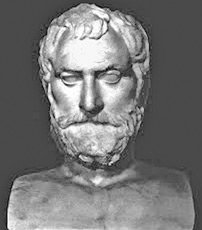The birth pangs of philosophy
 Even a cursory glance at human history would reveal that philosophy
came very much later than religion. The prehistoric man did not have an
organised religion or religious places for worship. Massive trees,
mountains, fire, the sun and moon became part of his religion. He
treated them as gods or goddesses as they were beyond his comprehension. Even a cursory glance at human history would reveal that philosophy
came very much later than religion. The prehistoric man did not have an
organised religion or religious places for worship. Massive trees,
mountains, fire, the sun and moon became part of his religion. He
treated them as gods or goddesses as they were beyond his comprehension.
Even in his primitive state man used to question about the world and
his place in it. He found the answers in the primitive religions. He
considered thunder and lightning as the work of angry gods. To appease
gods he sometimes made animal or human sacrifices. Human civilisation
marched forward despite man’s ignorance of what the universe was all
about.
After many centuries, man found that ancient religious explanations
were thoroughly inadequate. In his search for convincing answers, he
stumbled on reason more than faith. When man began to reason, it led to
the birth of philosophy. The first noteworthy pre-Socratic philosopher
was Thales of Miletus, a Greek settlement in modern-day Turkey. Thales
goes down in history as the first philosopher to inquire into the nature
of the universe.
Basic question
Thales’ basic question was, “What is the world made of?” The answers
provided by him formed the foundations of scientific thought. This led
to a strong relationship between science and philosophy. Pythagoras
tried to explain the world in terms of mathematics. Even today
mathematics is an important component of philosophy. Pythagoras’
mathematical explanations of the cosmos had a profound influence on
scientific thought.
|

Thales of Miletus, the first pre-Socratic
philosopher |
With the gradual expansion of Greece, philosophy too spread to other
areas. At the time Athens was the hub of Greek civilisation. It was a
fertile ground for budding philosophers to expand their horizon. Athens
eventually produced three eminent philosophers. One was Socrates, the
wisest man in the ancient world. He was the forerunner of classical
Greek philosophy. His ideas led to the future course of philosophy.
Socrates’ best pupil Plato founded a philosophical school called the
Academy in Athens. He propagated his master’s ideas sometimes
embellishing or criticising them. Plato’s best pupil Aristotle spent 20
years at the Academy.
So, today we know that Socrates, Plato and Aristotle laid the
foundation of western philosophy. What is noteworthy is that all of them
were independent thinkers in their own right. Sometimes, the pupils
disagreed with their masters. That is the nature of real philosophy.
Disintegration
With the death of Alexander the Great, the classical period of
ancient Greece came to an end. The death of Alexander saw the gradual
disintegration of Greek city states. On the death of Aristotle,
philosophy too branched out into different schools of thought. Cynics,
Sceptics, Epicureans and Stoics began to compete among themselves for
supremacy.
After a few centuries, Greek civilisation found itself on the wane.
In its place, the Roman Empire spread its tentacles. As can be expected,
the Romans did not pay much attention to Greek philosophy. However,
Greek philosophical ideas were very much in vogue because they had been
committed to writing. As a result, there was a resurgence of Greek
philosophical ideas during the medieval period.
While the western philosophy was in the making, eastern thinkers too
were busy questioning conventional wisdom. Early Chinese philosophers
were more concerned with organising a just society than questioning the
nature of the universe. They laid down moral guidelines. Many schools of
thought flourished in China. Notably, Confucianism and Taoism dominated
Chinese philosophy until the 20th century.
Buddhism
India produced an equally or more eminent philosopher and religious
teacher at this time. He was the Buddha. His teachings spread far and
wide in India and Asia. Millions of people practise Buddhism in many
parts of the world today.
In the modern world Buddhism has been embraced as a religion and
philosophy as well. In eastern countries, most people consider Buddhism
as a religion. They put up huge statues of the Buddha, temples for
bhikkhus and other places of religious worship.
It is a moot point to consider whether Asians have lost the
philosophical significance of Buddhism. However, the Western world seems
to value Buddhism more as philosophy than a religion. They study the
Tripitaka and discuss philosophical concepts found in Buddhism.
During his lifetime, the Buddha was an archetype unto himself. Today
the archetype of the Buddha is a major source of meaning and purpose for
billions of people. He was a sage, yet more than a sage.
|

